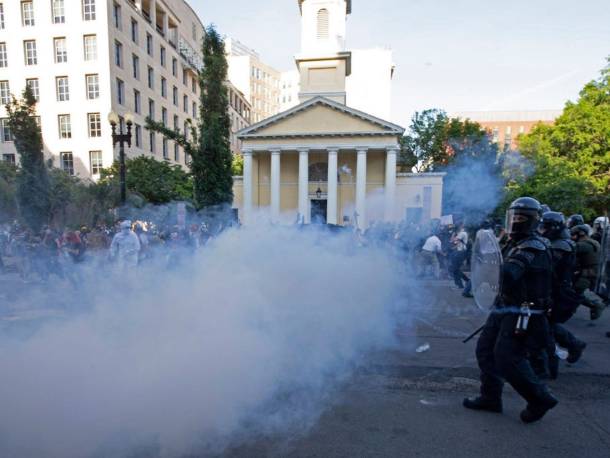Important!
On Monday, June 1, 2020 CE, President Donald J. Trump ordered protestors cleared from Lafayette Park, between the White House and historic St. John’s Episcopal Church. The Rt. Rev. Larry R. Benfield is the 13th Bishop of Arkansas. This was his response to Trump’s stunt.A Letter from Bishop Benfield
Read the Bible, especially Micah 6:8: “What does the Lord require of you but to do justice, and to love kindness, and to walk humbly with your God?”
To see the president of the United States stand in front of an historic Episcopal church with a Bible in hand as a political prop—while using rubber bullets to clear his path and having previously relished the thought of vicious dogs attacking protesters—is a great evil. As is the silent complicity of Cabinet officials and members of Congress. For me to remain silent would be evil as well.
Our nation is currently suffering the effects of what is truly its original sin: human greed that has manifested itself through four hundred years of self-serving racial superiority, the ownership of human beings, and an ongoing economic inequality that praises profits above all else and tries its best to keep people of color and the poor marginalized.
The overarching, consistent message of the Bible is compassion: the very mercy, justice, and humility that Micah proclaimed as a prophet. The overarching, consistent message of Christianity is resurrection: to seek and serve the risen Christ in all persons. We have seen none of this sort of behavior in our public officials. In fact, just the opposite. We Christians are called to step into this breach through our own lives and actions and proclamations.
Important!
Today, Tuesday, June 9, 2020 CE, an email with the subject “Communiqué #916” arrived. Apparently the bishop’s earlier message had ruffled some delicate feathers among the flock. Here is his defense of that earlier message…A Letter from Bishop Benfield
Last week I sent out a Communiqué article reflecting on the president’s misuse of Holy Scripture and an Episcopal Church near the White House for a photo op. The action itself and the events leading up to it were parts of a crisis in race relations that is both societal and religious. I admit that my statement was strongly worded. Some of you were upset with it, and you let me know. Thus, I want to share with you why I felt my statement was necessary.
The Episcopal Church in Arkansas unfortunately has a history of being complicit in the sin of racism, sometimes consciously, sometimes unconsciously. Here are some facts.
- The first Episcopal priest ordained in Arkansas, William Stout, was a major slaveholder with plantations at the foot of Petit Jean Mountain. During the Civil War he left his family in Arkansas, while taking a majority of his 151 slaves to Texas to protect his investment.
- In 1903 the then bishop of Arkansas determined that the races must be separated for the greater good of the church, and thus the Episcopal Church in Arkansas was segregated.
- Arkansas made progress in 1917 in electing Edward Demby as the Episcopal Church’s first African American bishop to be ordained on U.S. soil. The unfortunate side to the story is that many people hoped that he could organize our black congregations so that they could eventually form their own denomination, thus leaving the Episcopal Church to white people.
- In the early part of the twentieth century, the murder of several black Arkansans was planned, in part, in an Episcopal church building.
- In 1932 the search for a new bishop in Arkansas resulted in the election of someone generally perceived as a racist. The black members of the clergy were not allowed to receive Holy Communion with the white delegates at that electing convention. Told to go to the basement instead. The uproar was so fierce that the larger Episcopal Church refused to give consent to Arkansas’s election. That is a very rare occurrence.
- Eventually, during the Civil Rights era, our church’s well-intentioned effort to integrate churches resulted in the closing of our historically black congregations and inviting their members to join our white congregations. In an act of unintentional racism, we were making it known which congregations we saw as more important.
Thus, in June 2020, as yet one more Civil Rights march brought back images of the brutal responses to the Civil Rights marches of the 1950s and ’60s, it seemed important not to remain silent. To have said nothing would have been to add another chapter to our diocesan history.
We need to face racial discrimination in America and take actions to change the structures that perpetuate racial and economic inequality. To use the imagery of Old Testament prophets, sometimes the church has to stand at the city gate and say some hard things. It is one of the parts of being bishop that I least like; I prefer to be a good pastor and let everyone know that all are welcome, even if they disagree with me. And when I visit you, you are welcome to tell me that you disagree. But we need to change how we defend the very people who have no helper, which, by the way, is the final vow that I had to take before I could became your bishop. What we can hope for is lasting change as a result of what has taken place.
Faithfully yours,
Larry Benfield
Bishop of Arkansas
Second photo. https://journaltimes.com/ap/national/tear-gas-threats-for-protesters-before-trump-visits-church/
Third photo by Patrick Semansky (AP). https://www.politico.com/news/2020/06/03/house-protests-trump-photo-op-299163



